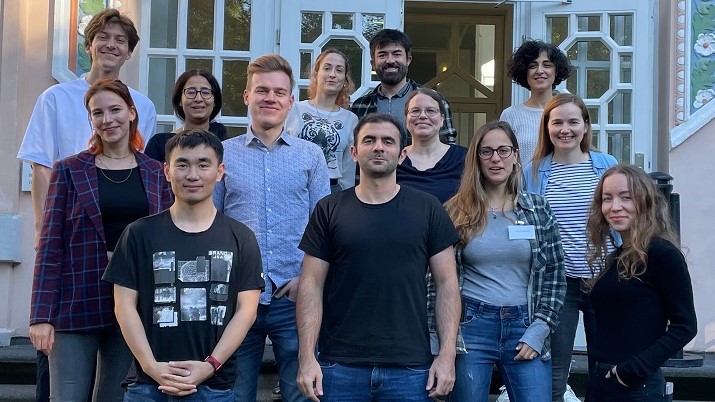
INTEGRATED RESEARCH TRAINING:Communication as part of research
Photo: Max Eberts privat
SFB874 junior researchers explore the world of media and social media at the IRTG Summer School
Eleven doctoral students and two post-doctoral researchers were able to experience how far-reaching and future-oriented the training opportunities of the Integrated Research Training Group (IRTG) in the Collaborative Research Centre 874 (SFB 874) are – at the IRTG Summer School on 21 and 22 September in Mülheim an der Ruhr. #WissKomm was on the agenda and thus two well-filled seminar days to make the young scientists of the SFB 874 fit for responsible communication in science.
External speakers were the media coach and former BBC journalist Malcolm Love and Prof. Dr Micah Allen from the Institute for Clinical Medicine – Center of Functionally Integrative Neuroscience at Aarhus University.
BBC journalist Malcolm Love and Prof. Dr Micah Allen as external speakers
While Malcolm Love gave the participants a five-hour media training with many practical elements, Micah Allen – whose account “@micahgallen” on Twitter has over 19 thousand followers – spoke about the importance of the microblogging service “Twitter” for science communication.
“Today, scientists no longer sit in seclusion in their offices and laboratories and do their research,” emphasises Ursula Heiler, who has been co-responsible for the SFB 874’s communication and external presentation as project manager for public relations since 2010. She herself gave an introduction to the broad spectrum of science communication at the Summer School and emphasised: “Networking, presenting and publishing one’s own work are just as much a part of research today as the original research work itself.”
The importance of science communication in Germany has even been enshrined in law for two years now. According to a resolution passed by the German Bundestag in September 2020, scientists are obliged to communicate the results and practical applications of research to the general public and to inform people about scientific issues and methods.
The Integrated Research Training Group offers a structured qualification in the field of sensory neuroscience and at the same time promotes the scientific independence of our participants. Communication skills are an important facet of this. Especially in basic research, communicating research in a meaningful way is essential – on the one hand, to grant the public access and create transparency and trust, but on the other hand, also to acquire public funding and thus lay the financial foundation for new research successes.
Dr Sabine Dannenberg, coordinator of SFB 874
The concept of the Summer School was a complete success – already during the Summer School, people were busy communicating and working on the network. “It was a great concern of ours to give the young researchers the direct opportunity to exchange ideas during the Summer School,” describes Dr Eva Gentes, coordinator of the IRTG and organiser of the Summer School. “The Wolfsburg in Mülheim with seminar rooms and overnight accommodation under one roof offered ideal conditions for this. In the evening, the participants sat together for a long time with speaker Micah Allen, who gave them valuable insights into the everyday work of a neuroscientist.”
